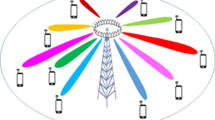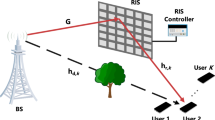Abstract
Spectral efficiency (SE) and energy efficiency (EE) are both important metrics in massive multiple-input multiple-output (MIMO) systems. However, maximizing EE and SE is always conflicting with each other, and they can hardly be achieved simultaneously. In this paper, we focus on the tradeoff optimization between EE and SE in multiuser massive MIMO systems in terms of the number of transmit antennas and the transmit power. Different from the previous EE-oriented or SE-oriented method, the EE–SE tradeoff problem is formulated into a multi-objective optimization problem. To efficiently attain the Pareto optimal front (POF) of EE–SE tradeoff, a multi-objective adaptive genetic algorithm, inspired by the non-dominated sorting genetic algorithm (NSGA-II), is proposed to improve the convergence speed. Experimental comparisons against several well-known multi-objective algorithms show that the proposed algorithm can quickly adapt to the true POF of EE–SE tradeoff and maintain good performance on benchmark functions in terms of the adopted performance metrics.












Similar content being viewed by others
References
Amin O, Bedeer E, Ahmed MH, Dobre OA (2014) Energy efficiency and spectral efficiency trade-off for OFDM systems with imperfect channel estimation. In: Proceedings of the 2014 IEEE international conference on communications (ICC), Sydney, Australia, pp 355–3558
Amin O, Bedeer E, Ahmed MH, Dobre OA (2016) Energy efficiency-spectral efficiency tradeoff: a multiobjective optimization approach. IEEE Trans Veh Technol 65(4):1975–1981
Bechikh S, Chaabani A, Said LB (2015) An efficient chemical reaction optimization algorithm for multi-objective optimization. IEEE Trans Cybern 45(10):2051–2064
Björnson E, Sanguinetti L, Hoydis J, Debbah M (2015) Optimal design of energy-efficient multi-user MIMO systems: is massive MIMO the answer? IEEE Trans Wirel Commun 14(6):3059–3075
Cobb CW, Douglas PH (1928) A theory of production. Am Econ Rev 18(1):139–165
Coello Coello AC, Pulido GT, Lechuga MS (2004) Handling multiple objectives with particle swarm optimization. IEEE Trans Evol Comput 8(3):256–279
Deb K, Pratap A, Agarwal S, Meyarivan T (2002) A fast and elitist multiobjective genetic algorithm: NSGA-II. IEEE Trans Evol Comput 6:182–197
Deng L, Rui Y, Cheng P, Zhang J, Zhang QT, Li MQ (2013) A unified energy efficiency and spectral efficiency tradeoff metric in wireless networks. IEEE Commun Lett 17(1):55–58
Duan H, Gan L (2015) Orthogonal multiobjective chemical reaction optimization approach for the brushless DC motor design. IEEE Trans Magn 51(1):1–7
Goh C, Tan KC (2007) An investigation on noisy environments in evolutionary multiobjective optimization. IEEE Trans Evol Comput 11(3):354–381
Héilot F, Imran MA, Tafazolli R (2012) On the energy efficiency-spectral efficiency trade-off over the MIMO Rayleigh fading channel. IEEE Trans Commun 60(5):1345–1356
Hesami P, Laneman JN (2011) Limiting behavior of receive antenna selection. In: Proceedings of the IEEE annual conference on information sciences and systems, Baltimore, USA, pp 1–6
Huang Y, Qiu L (2014) On the energy efficiency-spectral efficiency tradeoff in random beamforming. IEEE Wirel Commun Lett 3(5):461–464
Jiang SY, Yang SX (2017) A steady-state and generational evolutionary algorithm for dynamic multiobjective optimization. IEEE Trans Evol Comput 21(1):65–82
Jiang D, Zhang P, Lv Z, Song H (2016) Energy-efficient multi-constraint routing algorithm with load balancing for smart city applications. IEEE Internet Things J 3(6):1437–1447
Jung M, Kim T, Min K et al (2013) Asymptotic distribution of system capacity in multiuser MIMO systems with large number of antennas. In: Proceedings of the 2013 IEEE 77th vehicular technology conference (VTC Spring), Las Vegas, USA, pp 1–5
Kwon H, Birdsall T (1986) Channel capacity in bits per Joule. IEEE J Ocean Eng 11(1):97–99
Lam AYS and Li VOK (2010) Chemical-reaction-inspired metaheuristic for optimization. IEEE Trans Evol Comput 14(3):381–399
Li H, Song L, Zhu D, Lei M (2014) Energy efficiency of large-scale multiple antenna systems with transmit antenna selection. IEEE Trans Commun 62(2):638–647
Lin IC, Han S, Xu Z, Pan Z (2014) EE–SE relationship in MIMO systems. In: Proceedings of the 2014 IEEE international wireless symposium (IWS), Beijing, China, pp 1–4
Liu ZJ, Du WM, Sun DC (2017) Energy and spectral efficiency tradeoff for massive MIMO systems with transmit antennas selection. IEEE Trans Veh Technol 66(5):4453–4457
Lu H, Yen GG (2003) Rank-density-based multiobjective genetic algorithm and benchmark test function study. IEEE Trans Evol Comput 7(4):325–343
Mohammed K, Huq S, Mumtaz S et al (2014) Energy efficiency optimization in MU-MIMO systems with spectral efficiency constraint. In: Proceedings of the 2014 IEEE symposium on computers and communications (ISCC), pp 1–5
Onireti O, Hliot F, Imran MA (2011) Closed-form approximation for the trade-off between energy efficiency and spectral efficiency in the uplink of cellular network. In: Proceedings of the 11th European wireless conference, Vienna, Austria, pp 706–711
Schott J (1995) Fault tolerant design using single and multicriteria genetic algorithm optimization. M.S. thesis, Massachusetts Technology
Tang J, So D, Alsusa E, Hamdi K (2014) Resource efficiency: a new paradigm on energy efficiency and spectral efficiency tradeoff. IEEE Trans Wirel Commun 13(8):4656–4669
Tiwari S, Fadel G, Deb K (2010) AMGA2: improving the performance of the archive-based micro-genetic algorithm for multi-objective optimization. Eng Optim 43(4):377–401
Tsilimantos D, Gorce JM, Runser KJ, Poor HV (2016) Spectral and energy efficiency trade-offs in cellular networks. IEEE Trans Wirel Commun 15(1):54–66
Verdu S (2002) Spectral efficiency in the wideband regime. IEEE Trans Inf Theory 48(6):1319–1343
Yuan Y, Xu H, Zhang B, Yao X (2015) Balancing convergence and diversity in decomposition-based many-objective optimizers. IEEE Trans Evol Comput 19(5):694–716
Zitzler E, Deb K, Thiele L (2000) Comparison of multiobjective evolutionary algorithms: empirical results. Evol Comput 8(2):173–195
Acknowledgements
This work was supported in part by the National Natural Science Foundation of China (No. 61201135), in part by the Chinese Postdoctoral Science Foundation (3464), in part by the Shaanxi Natural Science Foundation (No. 2015JQ6245), in part by the Fundamental Research Funds for the Central Universities (No. 7214569601) and in part by the 111 Project (B08038).
Author information
Authors and Affiliations
Corresponding author
Ethics declarations
Conflict of interest
The authors declare that they have no conflict of interest.
Ethical approval
This article does not contain any studies with human participants or animals performed by any of the authors.
Informed consent
Informed consent was obtained from all individual participants included in the study.
Additional information
Communicated by V. Loia.
Publisher’s Note
Springer Nature remains neutral with regard to jurisdictional claims in published maps and institutional affiliations.
Rights and permissions
About this article
Cite this article
Hei, Y., Zhang, C., Song, W. et al. Energy and spectral efficiency tradeoff in massive MIMO systems with multi-objective adaptive genetic algorithm. Soft Comput 23, 7163–7179 (2019). https://doi.org/10.1007/s00500-018-3356-x
Published:
Issue Date:
DOI: https://doi.org/10.1007/s00500-018-3356-x




